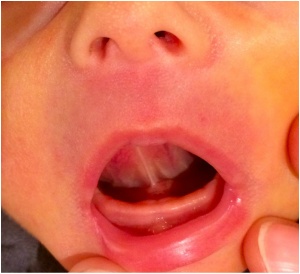 I was recently interviewed by Sheila Coles from the Morning Edition on CBC Regina. We were discussing tongue ties, laser revision and new supports coming to Regina. Here is a link for anyone wanting to have a listen http://www.cbc.ca/morningedition/episode/2013/02/14/help-for-tongue-tied-babies/ Some of what was higlighted in the six minute discussion I have summed up below plus expanded a small amount for clarity. The definition of (tongue or lip) tie is restricted mobility as a result of a short and/or tight frenulum. Restricted mobility impacts the function of the tongue. (And the tongue is a key player in breastfeeding). The definition of a tie is a functional one used in conjunction with visual assessment. Using only appearance qualities to make a diagnosis causes professionals to miss some ties but could also lead to over-treatment. Visual assessment alone is not adequate for diagnosis and treatment decisions. The evaluation of function must take precedence over appearance so that over treatment can be avoided. Depending on symptoms will depend on who you may need to help make an assessment. (Lactation consultant, dentist, speech pathologist, chiropractor, osteopath,etc) It can be a interdisciplinary approach from assessment to treatment. 2-12% (and perhaps higher) of the population are said to be affected by ties depending on the population under study and the definition used. There are various grades of ties identified which can impact symptoms, diagnosis and treatment. The current lack of awareness and education are often barriers to assessment & treatment. Like everything in medicine advancements are made. Lasers have now provided us advancement in treatment of oral restrictions with benefits over scissor releases. Scissors bleed, can be messy, cannot always reach all ties efficiently and have more of a one-time chance. Lasers do not bleed, user has more control, practioner can get back further to ensure a deep enough release and can assess as the procedure is being done. Lasers also have anesthetic properties as well as antibacterial properties. Symptoms can be maternal and/or baby: maternal pain, nipple damage, engorgement, mastitis, thrush, low milk supply, weight loss in baby, slow weight gain in baby, failure to thrive babies, reflux, colic, digestion issues, fatigue, slow feeds, difficulty latching, gagging, choking, coughing, breast refusal, shallow latch, chin tremors, clicking noises, fretful Breastfeeding Impact • Inadequate latch that interferes with milk transfer • Insufficient milk intake and inefficient feeding due to inability to maintain and adequate tongue seal • Nipple/breast pain and damage • Compromised normal suck-swallow-breathe patterns • Long feeds • Possible weight gain compromise • Reduced milk supply • Early weaning • Need to supplement Beyond breastfeeding • Bottle-fed baby can also struggle • Babies may have trouble with solid foods (reverse swallowing) • Speech may be affected • Orofacial development (high, narrow palate, orthodontics) • Dental issues • Increased salivation • Airway integrity and apnea Feeding and milk supply concerns can be worked on with the assistance of a Lactation Consultant. There are various tools and management techniques that can be used depending on each unique situation. Tongue mobility is the goal of laser treatment. The secondary results, such as increased milk transfer occur only when treatment restores optimal tongue placement, movement and strength. Function restoral is generally dependent on a team approach to care including dentists, bodyworkers (osteopathy, chiropractic) and lactation consultants. When breastfeeding is the concern the earlier the treatment the better but that is not to say later treatment is not beneficial to other symptoms that may arise. Tongue ties are a controversial and subjective topic currently. The team approach will be growing in Regina soon with a local dentist coming on board to help with treatment.  I asked this question of my Facebook friends earlier this week. What do dentists, midwifes and chiropractors all have in common? I received a wide variety of answers and all were very points. Let us have a look at some of the answers. "You totally dismiss their existence or possible usefulness until it turns out you need one?" This one had the most likes, and for good reason. I don't know what it is like in other places in the world specifically but I know in Saskatchewan what these practitioners are able to do for health and wellness and care is not well understood. Dentists would be the most commonly accepted practitioner of the three but they still are not fully understood as far as their role in things beyond healthy teeth; more to come on that later. Midwives are growing in popularity but again until you need one you probably wouldn't have paid much attention to them and all the benefits they serve in a community and why we so desperately want more of them. I think everyone needs to care about increasing our midwifery numbers and access to them in all communities, not just our currently pregnant moms. And chiropractors; they are a hidden secret in health and wellness. Most commonly known for snapping necks and popping bones back into place even though that is rarely what they do & definitely not what they want to be doing. They really want to help your body be sound structurally since the basis of function comes down to structure. If a structure isn't 100%, it isn't going to function at 100%. The scope and importance of these practitioners cannot go underestimated. "I would guess that they aren't considered necessary to medical care (by the powers that be…)" This was one of my favourite answers, because it some days it really feels that way. There are jokes by doctors that I have heard before such as "What do you call a doctor that failed out of medical school" - "A dentist". Chiropractors and midwives are not easily accepted into western medical practice, either. Both would be considered "alternative" even though as far as practice goes as ancient times. They fell out of medicine for quite some time and in the late 20th century started to become a popular choice again. Having said all this, that wasn't the point I was trying to make. "You refer to them? Or they refer to you?" Next on the list of answers was about my referrals to these allied practitioners & referrals to me. Yes, this happens, both ways. It happens for many different reasons. Depending on where a mother is prenatally or postnatally would depend on the referrals and why, but the point is we can all work closely togther. This leads into the next answer. "All can play a vital role in supporting a healthy breastfeeding relationship, along with lactation consultants create the circle of support for breastfeeding moms and babies with tongue and lip ties." Now, I love this answer. We are getting somewhere on where I was going with the question. I would say that we could have simply said, "all can play a vital role in supporting a healthy breastfeeding relationship, along with lactation consultants create the circle of support for breastfeeding moms and babies" and we could have had I not mentioned the dentists. My reasoning for that is because tongue and lip ties are part of why I posed the original question and because it was in the answer. However, there can be lots of issues aside from tongue and lip ties that a midwife and chiropractor could help with. Add in the tongue and lip ties and, yes, then we need a dentist. But now look at the other person mentioned in this answer and mentioned in the circle; lactation consultants. This was the answer I was looking for. They are all knowledgable professionals, but they are not IBCLC's. Lactation Consultants are at the hub of it all. Some people would actually suggest it isn't really a circle that would be formed but rather think of an IBCLC more as a project coordinator, like a general contractor. The general contractor is a manager. An IBCLC must first assess the breast-feeding relationship. A consult is required to get a better understanding of the breastfeeding dynamics . The IBCLC than can recommend specialized “subcontractors" to perform tasks that are needed to meet the goals of the breast-feeding mother and help resolve some of the challenges. Then the IBCLC as the specialist in breastfeeding can do another consult to fine tune the work of all the “subcontractors”. This is really important as many of the symptoms of tongue and lip ties can be because of many other things. We need someone to assess that all. That needs to be an IBCLC. While the other practitioners have knowledge of breastfeeding and how it all works, they are not specialists in all things lactation. Some of the practitioners are going to assume that moms and babies are working with a lactation consultant and some are going to be a little more forward in making sure that moms and babies are indeed working with an IBCLC. Sometimes we need to plan how and when to fix tongue ties based on what all is happening with mom and baby. An example would be needing to resolve moms milk supply so that after baby has his tongue and lip tie fixed, he is rewarded easily with a good supply. It can be challenging for mom to do this while caring for a baby after the procedure. Another example is oral exercises for baby. You can think about this as rehabilitation. We cannot make a change to a babies physical structures without helping that baby adapt to the changes - again, this comes down to what an IBCLC is going to teach and assist parents and babies with. The IBCLC will further assess for improvements and make recommendations as needed. Keep in mind, these are only two examples of what an IBCLC is going to do. It is really hard to skip over some of the practitioners. Sometimes things will not resolve at all or much more slowly than needed unless we have a solid team trying to resolve the issues at hand. I think it is incredibly important before we go ahead and perform any procedure on any baby, that this idea is well explained, understood & accepted so that ultimate, ideal care is provided to families, especially the baby who needs the most support. |
Kim Smith
|
 RSS Feed
RSS Feed
